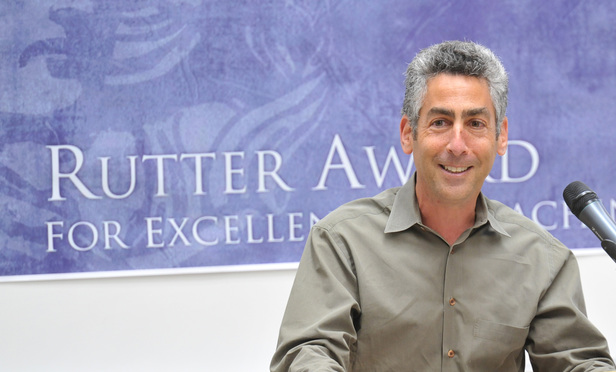 Professor Stuart Banner of UCLA School of Law.
Professor Stuart Banner of UCLA School of Law.
Stuart Banner is a legal historian who has written books on the history of baseball’s antitrust exemption, the struggle to control airspace and how American Indians lost their land. On Wednesday, Banner achieved a new distinction: He won his first U.S. Supreme Court argument.
Banner, a law professor at the University of California, Los Angeles, and a former clerk to Justice Sandra Day O’Connor, won in the high court in Nelson v. Colorado. The justices, in a 7-1 opinion by Justice Ruth Bader Ginsburg, held that Colorado’s Exoneration Act—the exclusive scheme for refunds of costs, fees and restitution paid by exonerated defendants—violated the Fourteenth Amendment’s guarantee of due process.
The Colorado Supreme Court had held that the Exoneration Act, which requires a defendant seeking a refund to show innocence by clear and convincing evidence, was the only state authority for refunds. Neither of the two petitioners, Shannon Nelson and Louis Alonzo Madden, had filed a claim under that act.
Ginsburg, applying a due process balancing test, said the presumption of innocence was restored when the convictions were reversed. “Colorado has no interest in withholding from Nelson and Madden money to which the State currently has zero claim of right,” Ginsburg wrote.
Lawyers for Nelson and Madden approached UCLA’s Supreme Court Clinic following the Colorado Supreme Court decision to see if the clinic would be interested in helping to take the cases to the U.S. Supreme Court, Banner, who heads the clinic, recalled. He argued the case in the high court in January.
The National Law Journal caught up with Banner after his morning run and while he was still digesting the decision and victory. These are excerpts, edited for clarity and length, from the conversation.
NLJ: This was your first argument in the Supreme Court, but you are no stranger to that courtroom.
Banner: I clerked for Justice O’Connor in the 1991-92 term. I have helped others do oral arguments and have sat at the counsel table. I had watched a bunch of [cases] but never actually had done one myself. It was sort of part-old and part-new in that sense.
When the UCLA law clinic was approached about taking the two cases, were they obvious candidates for a cert petition?
When I read the Colorado Supreme Court opinion, I was kind of stunned. It seemed so weird to me that it would be OK to reverse somebody’s conviction and not give them their money back. We thought this would be a good case for a cert petition.
The Colorado Criminal Defense Bar wrote an amicus brief supporting the petition, which was very helpful at the cert stage. It gave the whole background of this weird statute. The way they described it, the Colorado Legislature didn’t really intend to stop refunding money when convictions were reversed. The statute did so inadvertently. That was so helpful that we ended up incorporating that material into our merits brief.
What role did the clinic’s law students play in the Supreme Court cases?
The students helped with the researching and writing of the cert petition. That happened during our spring semester of last year. The petition was granted at the court’s first conference back in September. The next year, the students helped in researching and writing the merits brief. It’s a great experience. I wish I could have done something like that [as a student].
The hardest thing about this case was that what Colorado was doing, no state had ever tried to do before. There weren’t any precedents or cases directly on point. We had to make analogies to all sorts of things governments had tried to do.
How did you prepare for the argument?
I did a bunch of moot courts—two in Los Angeles and two in D.C. I got there the week before the argument. To say I have a “system” would be too strong. I tried to think of every possible question that I could get asked and a sensible answer.
The night before the argument I went to dinner with my wife and son who were there to watch, and then went to bed early. Since I’m a law professor, I don’t wear a suit and tie normally. I had to find my suit and tie, which I only pull out for weddings and funerals.
Did you get any questions during the arguments that you had not anticipated?
One good thing about my preparation—there weren’t any new questions. There were no questions that someone hadn’t asked in the moot courts. There were times I felt I wasn’t as articulate as I should have been, but I never felt stumped for an answer.
The UCLA clinic has had six cases in the high court in last two terms. What do you still have pending in the present term?
We also did Lee v. Tam. We represent Simon Tam and his band, The Slants, in the trademark challenge (argued Jan. 18 by John Connell of Archer & Greiner of Haddonfield, New Jersey).
Related Articles:




